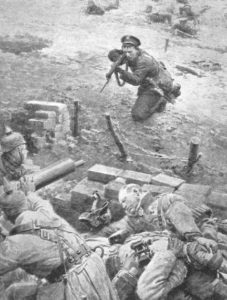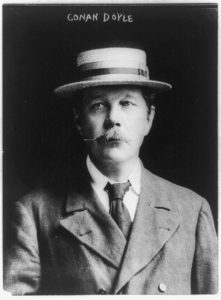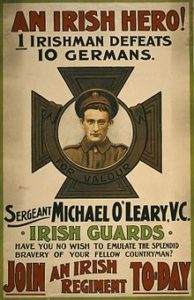Lance Corporal Michael O’Leary
1st Battalion, Irish Guards
(1888 – 1961)
Cuinchy, France – February 1st, 1915:

In full view of both the enemy and his commanding officers, O’Leary rushed the German line. He killed 5 enemy soldiers and 3 machine gun teams. Remaining enemy solders were captured as prisoners (1).
A copy of the London Gazette describing these actions and announcing his V.C. win can be found here
Homecoming:
After his heroic actions on the front, O’Leary traveled to London to receive his V.C. in person from King George V.
Following his London visit, O’Leary was “received as a hero in his native Cork when he arrived home in June 1915” (2). There were thousands lining the street for their native hero’s triumphant return from the Front.
Accolades for O’Leary:

- The Irish have always had a reputation of being wonderful fighters, and Lance-Corporal Michael O’Leary is clearly one of them. – Sir Arthur Conan Doyle, author of the Sherlock Holmes series (3)
- All Ireland is proud of O’Leary. He fully deserves the high honour that has been conferred upon him. Ireland is grateful to him. – Thomas Scalan, MP, Irish politician serving in the British Parliament (4)
Jack Judge’s 1915 song Michael O’Leary V.C. commemorating the actions of the Irishman
Propaganda’s Golden Boy:
Michael O’Leary is perhaps best remembered for the 1915 propaganda poster that he was featured on. Distributed throughout Ireland, it was the first recruitment poster to prominently feature the face of “an Irish hero,” as the poster states. As an Irish appeal to the war effort, the poster was a direct attack against the anti-war propaganda of groups such as Sinn Fein, who said the Irish thing to do would be to not enlist. (5).
The Irish Times argued that:
“His actions in winning the VC were a propaganda gift for the British War Office. Recruitment in Ireland had been slower than in other parts of what was then the United Kingdom, and particularly so in rural Ireland … Here was an authentic Irish hero, a nationalist from a poor background.” (6)
Despite his massive celebrity during the war, O’Leary is often not commemorated today in Ireland.
(1). Richard Doherty and David Truesdale, Irish Winners of the Victoria Cross (Dublin: Four Courts Press, 2000), 107.
(2). Richard Doherty and David Truesdale, Irish Winners of the Victoria Cross (Dublin: Four Courts Press, 2000), 107-108.
(3). “Michael O’Leary VC,” Ballingeary & Inchigeela Historical Society, accessed December 13, 2016, http://www.ballingearyhs.com/journal2001/michael_oleary.html.
(4). “Michael O’Leary VC,” Ballingeary & Inchigeela Historical Society, accessed December 13, 2016, http://www.ballingearyhs.com/journal2001/michael_oleary.html.
(5). Desmond Bowen and Jean Bowen, Heroic Option: The Irish in the British Army (Barnsley: Pen and Sword Military, 2005), 224.
(6). Ronan McGreevy, “The life and troubled times of an authentic Irish war hero,” The Irish Times, January 30, 2015, accessed November 2, 2016, http://www.irishtimes.com/news/ireland/irish-news/the-life-and-troubled-times-of-an-authentic-irish-war-hero-1.2085610.
Further Reading:
“Lance-Corporal M J O’Leary VC,” The Western Front Association, accessed December 10, 2016, http://www.westernfrontassociation.com/great-war-people/vc-awards-in-the-great-war/4547-lance-corporal-m-j-o-leary-vc.html#sthash.5Y3AEczV.dpbs.


